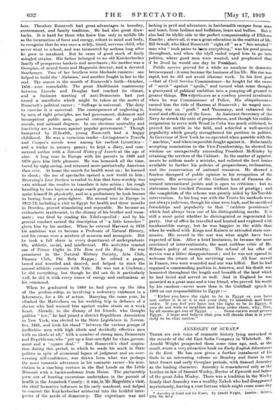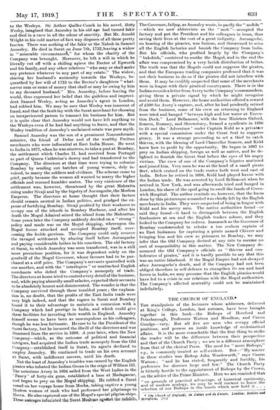ANNESLEY OF SURAT.*
THERE are rich veins of romantic history lying unworked in the records of the old East India Company, in Whitehall. Mr. Arnold Wright prospected them some time ago, and, as the result, wrote a very attractive book on Early English Adventurers in the East. He has now given a further instalment of his finds in an interesting volume on Bombay and Surat in the later Stuart and early Georgian periods, with Samuel Annesley as the leading character. Annesley is remembered only as the brother-in-law of Samuel Wesley, Rector of Epworth and father of the great John Wesley.. There. was a tradition in the Wesley family that Annesley was a wealthy Nabob who had disappeared mysteriously, leaving a vast fortune which might come some day • Annosky of Surat and Sig Timor, By Arnold Wright, London
Ills. Cid. act] .
to the Weeleys. Sir Arthur Quiller-Couch in his novel, Haig lI'esley, imagined that Annesley in his old age had turned fakir and died in a cave in all the odour of sanctity. But Mr. Arnold
Wright in his cold matter-of-fact way disposes of all these pretty fancies. There was nothing of the fakir or the Nabob in Samuel Annesley. He died in Surat on June 7th, 1732, leaving a widow in "miserable circumstances," for whom the charity of the Company was besought. Moreover, he left a will in which he literally cut off with a shilling apiece the Rector of Epworth and his family, and any other relatives "who may or shall snake any pretence whatever to any part of my estate." The widow,
sharing her husband's animosity towards the Wesleys, be- queathed by her will of 1733 to the Rector's daughters "what- soever sum or sums of money that shall or may be owing by him to my deceased husband." Mrs. Annesley, before leaving the world, thus expressed her belief that the guileless and improvi- dent Samuel Wesley, acting as Annesley's agent in London, had robbed him. We may be sure that Wesley was innocent of fraud, and that the fault lay with the Surat merchant for choosing an inexperienced parson to transact his business for him. But it is quite clear that Annesley would not have left anything to the Wesley% even if he had had anything to leave, and that the Wesley tradition of Annesley's unclaimed estate was pure myth. Samuel Annesley was the son of a prominent Nonconformist minister, the friend of Defoe and of the wealthy Puritan merchants who were influential at East India House. He went to India in 1677, when he was nineteen, to take a post at Bombay, the settlement which Charles II. had received from Portugal' as part of Queen Catherine's dowry and had transferred to the Company. The directors at that time were trying to colonize Bombay by sending out batches of young women, duly in- voiced, to marry the soldiers and civilians. The scheme came to grief, partly because the women all wanted to marry the higher officials and scorned bumbler mates. The very existence of the settlement was, however, threatened by the great Mahratta rising under Sivaji and by the bigotry of Aurungzebe, the Moslem Emperor. The directors at home thought that their factors should remain neutral in Indian politics, and grudged the ex- pense of fortifying Bombay. Sivaji profited by their weakness to occupy one of the islands in Bombay Harbour, and after hie death the Mogul Admiral seized the island from the Mahrattas. Some years later the Company suddenly decided on a " strong " policy and made war on the Mogul shipping, whereupon the Mogul forces attacked and occupied Bombay itself, over- coming the feeble garrison. The Company could only recover the ravaged settlement by abasing itself before Aurungzebe and paying considerable bribes to his cotwtiers. The old factory at Surat, to which Annesley was soon transferred, was in a still more precarious position, for it was dependent solely on the goodwill of the Mogul Governor, whose favours had to be pur- chased at a stiff price. The Company's servants quarrelled with one another, and with the " interlopers " or unattached English merchants who defied the Company's monopoly of trade. The directors at home tried to control every detail of the business, and, while paying absurdly small salaries, expected their servants to be absolutely honest and disinterested. The wonder is that the Company survived through these troubled years ; the explana- tion is, no doubt, that the profits of the East India trade were very high indeed, and that the rogues in Surat and Bombay found it to their advantage to maintain a connexion with a Company which had prestige in India, and which could give them facilities for investing their wealth in England. Annesley himself seems to have been as unscrupulous as his colleagues, though he was less fortunate. Heroes to be the Presidentof the Surat factory, but he incurred the illwill of the directors and was dismissed from the service in 1698. A year later, when the New Company—which, as the outcome of political and financial intrigues, had acquired the Indian trade monopoly from the Old Company—established itself in Surat, its agents declined to employ Annealey. He continued to trade on his own account at Surat, with indifferent success, until his death.
Not the least of Amiesley's troubles was caused by the English pirates who infested the Indian Ocean in the reign of William III. The notorious Avery in 1694 sailed from the West Indies in the Fancy ' of forty-six guns, established a base at Madagascar, and began to prey on the Mogul shipping. He robbed a Surat vessel on her voyage home from Mocha, taking captive a young Moslem woman of rank who had performed her pilgrimage to Mecca. He also captured one of the Mogul's special pilgrim ships. These outrages infuriated the Surat Modems agaiest the infidels, The Governor, failing, as Annesley wrote, to pacify the" mobile" —which we now abbreviate as the "mob "—occupied the factory and put the President and his colleagues in irons, thus saving their lives at the cost of a great indignity. Aurungzebe, on hearing of the piracies, was furious, and threatened to seize all the English factories and banish the Company from India. But his officials, who profited largely by the "Company's " bakshish," contrived to soothe the Mogul, and in the end the affair was compromised by a very lavish distribution of bribes. The truth was that the Moguls could not suppress the pirates, and that the European trading companies professed that it was not their business to do so if the pirates did not interfere with them, It may be credibly suspected that some of the merchants were in league with their piratical countrymen. There is in the Indian records a letter from Avery to the Company's commanders, giving them a private signal by which Ile might recognize and avoid them. However, the home authorities offered a reward of £500 for Avery's capture, and, after he had prudently retired from the business, some of his crew on returning to England were tried and hanged "between high and low water at Execu- tion Dock." Lord Bellamont; with the four Ministers Oxford, Somers, Romney, and Shrewsbury, formed a syndicate in 1696 to fit out the 'Adventure' under Captain Kidd as a privateer with a special commission under the Great Seal to suppress piracy. It was a strange proceeding to set a thief to catch thieves, with the blessing of Lord Chancellor Somers, and Kidd knew how to profit by the opportunity. lie began in 1697 to prey on Indian shipping, foreign as well as native, and he de- lighted to flourish the Great Seal before the eyes of his angry victims. The crew of one of the Company's frigates mutinied and joined him. Very soon he was at the head of a small pirate fleet, which cruised on the trade routes both west and east of India. Before he retired in 1698, Kidd had played havoc with the Indian trade. He was arrested by Lord Bellamont when he arrived in New York, and was afterwards tried and hanged in London, his share of the spoil going to swell the funds of Green- wich Hospital. The author reminds us, however, that the harm done by this picturesque scoundrel was chiefly felt by the English merchants in India. They were suspected of being in league with Kidd and his merry men. The native authorities found—or said they found—it hard to distinguish between the English freebooters at sea and the English traders ashore, and they looked to the Company for redress. Inasmuch as the Governor of Bombay condescended to rebuke a too zealous captain of an East Indiaman for capturing a pirate named Chivere and bringing him and his crew as prisoners to Bombay, we may infer that the Old Company desired at any rate to assume no sort of responsibility in this matter. The New Company de- nounced the Old Company's officials as "thieves and con- federates of pirates," and it is hardly possible to say that this was an entire falsehood. If the Mogul Empire had not decayed after Aurungzebe's death, and if the Company had not been obliged therefore in self-defence to strengthen its sea and land forces in India,we may presume that the English piracice would have led to a crisis in our relations with the Mogul authorities. The Company's affected neutrality could not be maintained indefinitely.



































 Previous page
Previous page